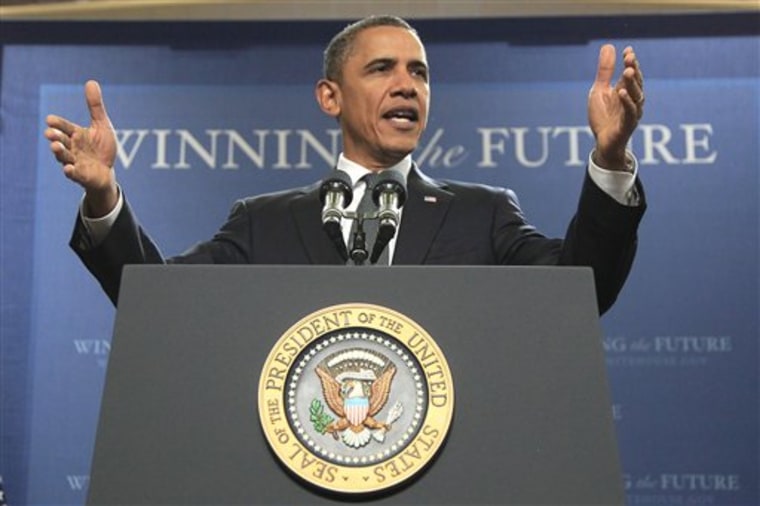President Barack Obama, turning briefly to his eclipsed domestic agenda Thursday, called on the nation's businesses to make fresh investments in clean energy technology that lay a foundation for long-term American prosperity.
He proposed a new tax credit and other measures to encourage businesses to retrofit their plants and reduce costs — steps that he said would save $40 billion a year in utility bills.
"Making our buildings more energy efficient is one of the fastest, easiest and cheapest ways to save money, combat pollution and create jobs," the president said, taking his retooled economic pitch to the heart of Pennsylvania, a prominent state in presidential politics that will be a key in his 2012 re-election bid.
Obama toured energy research labs at Penn State ahead of his remarks, showcasing a leader in the field of energy technology. The university heads a consortium of universities, colleges and industries that are developing a high-tech research hub, based in Philadelphia, on how to make buildings more energy-efficient. That center is supported by $129 million in federal money over the next five years.
"In America innovation isn't just how we change our lives, it's how we make a living," he said, pushing a key feature of an economic agenda that blends his goals of greater energy independence with a long-term job growth strategy.
The energy efficiency plan is an extension of Obama's call last year to give government rebates for home retrofitting, a proposal that has stalled in the Senate.
Obama's announcement was part of a White House effort to bolster the economic themes of his recent State of the Union address with specific proposals. His broader aim is to rally public support and congressional votes for a "clean energy" agenda that Obama says will cut costs and create jobs in the fields of the future.
The president's quick trip to State College, Pa., however, comes as the crisis in Egypt has dominated his time and consumed media attention. Obama is trying to press on with his economic ideas, ahead of the release of his budget plan on Feb. 14, while he manages his response to the violent clashes that have Egypt and the Mideast on the edge.
Obama returned to a state he won in the 2008 election after losing the Democratic primary to Hillary Rodham Clinton, now his secretary of state.
Pennsylvania is sure to figure prominently in his bid for re-election in 2012. The president toured some Penn State labs and spoke to an invitation-only audience about his energy proposals.
Key components of Obama's proposal
As part of his new plan, Obama will ask Congress to provide companies with a tax credit that financially rewards them for retrofitting their buildings in ways that decrease energy usage. The proposal would alter the existing tax break for such commercial upgrades, switching it from a deduction to a credit that applies more widely, administration officials said.
The president is also now calling for:
— Broader access to financing for businesses that want to make energy-saving upgrades, and loan guarantees for hospitals, schools and companies to do the same.
— Competitive grants for states and local governments that make it easier for companies to upgrade their buildings.
— More training for workers in the field of commercial building technology.
Making buildings more energy-efficient
And Obama plans to challenge CEOs and university presidents to commit to making their buildings more energy-efficient. Administration officials previewed elements of the president's initiative ahead of his morning travel to Pennsylvania.
Penn State is getting presidential attention as a leader in the field of energy technology. The university heads a consortium of universities, colleges and industries that are developing a high-tech research hub, based in Philadelphia, on how to make buildings more energy-efficient. That center is supported by $129 million in federal money over the next five years.
It is the largest grant in Penn State's history. On campus, Obama will get a look at some of the energy-efficiency research under way before delivering his comments.
The White House said it is targeting the commercial sector because its buildings consume roughly 20 percent of all energy in the U.S. economy. Administration officials offered no details on how much Obama's plan would cost. They said those details will be released in the budget and the proposed elimination of oil industry subsidies would help cover the costs.
